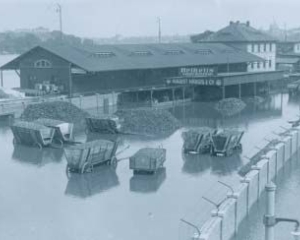2012 - 2014
The project analyzed and compared historical, recent and predicted conflicts and potential conflicts in the field of floods. Using the Rhine, Elbe and Danube as examples, a methodological toolkit for analyzing solutions to global water conflicts was developed in a transdisciplinary collaboration.

Floods are increasingly understood as a material-physical and at the same time socially shaped process, the course and influence of which cannot be fully predicted and controlled. It is therefore possible to develop a concept for dealing with floods that no longer focuses solely on their control and exclusion. Instead, it promotes solutions for adapting to and reducing flooding that take into account the complexity of the interactions between nature, technology and society. The factors that make up the spatial context and society's approach to floods interact closely with each other with regard to
- the spatial and temporal integration of natural processes,
- structural measures and protection and utilization requirements,
- risk awareness and interpretations of threat and security,
- coping and prevention as a long-term learning and negotiation process,
- normative regulation,
- breakdown of planning, construction and operation.
Conflicts of interest often arose or still arise between the groups involved and/or local residents over economic, ecological or even social factors. A comparative historical analysis is indispensable as a basis for future conflict mediation. Methods of environmental system modeling can also make a decisive contribution to the successful prevention, settlement or mediation of disputes. The theoretical approach is to examine the transferability of a socio-ecological spatial concept to the given issue and, in the positive case, to water conflicts in general.
The three-year research project was funded by the Klaus Tschira Foundation (external link).
Chairman of the Scientific Commission:
Prof. Dr.-Ing. E.h., Ph.D. Hermann H. Hahn
Heads of research:
- Prof. Dr. Dr. Franz-Josef Brüggemeier
- Prof. Dr.-Ing. Rainer Helmig
Employees:
- Dr. Thomas Haas
- Dipl.-Geogr. Katharina Stork
Contact:
Universität Stuttgart
Institut für Wasser- und Umweltsystemmodellierung
Lehrstuhl für Hydromechanik und Hydrosystemmodellierung
Pfaffenwaldring 61, 70569 Stuttgart
Telefon: 0711-685-64667 und -64511

